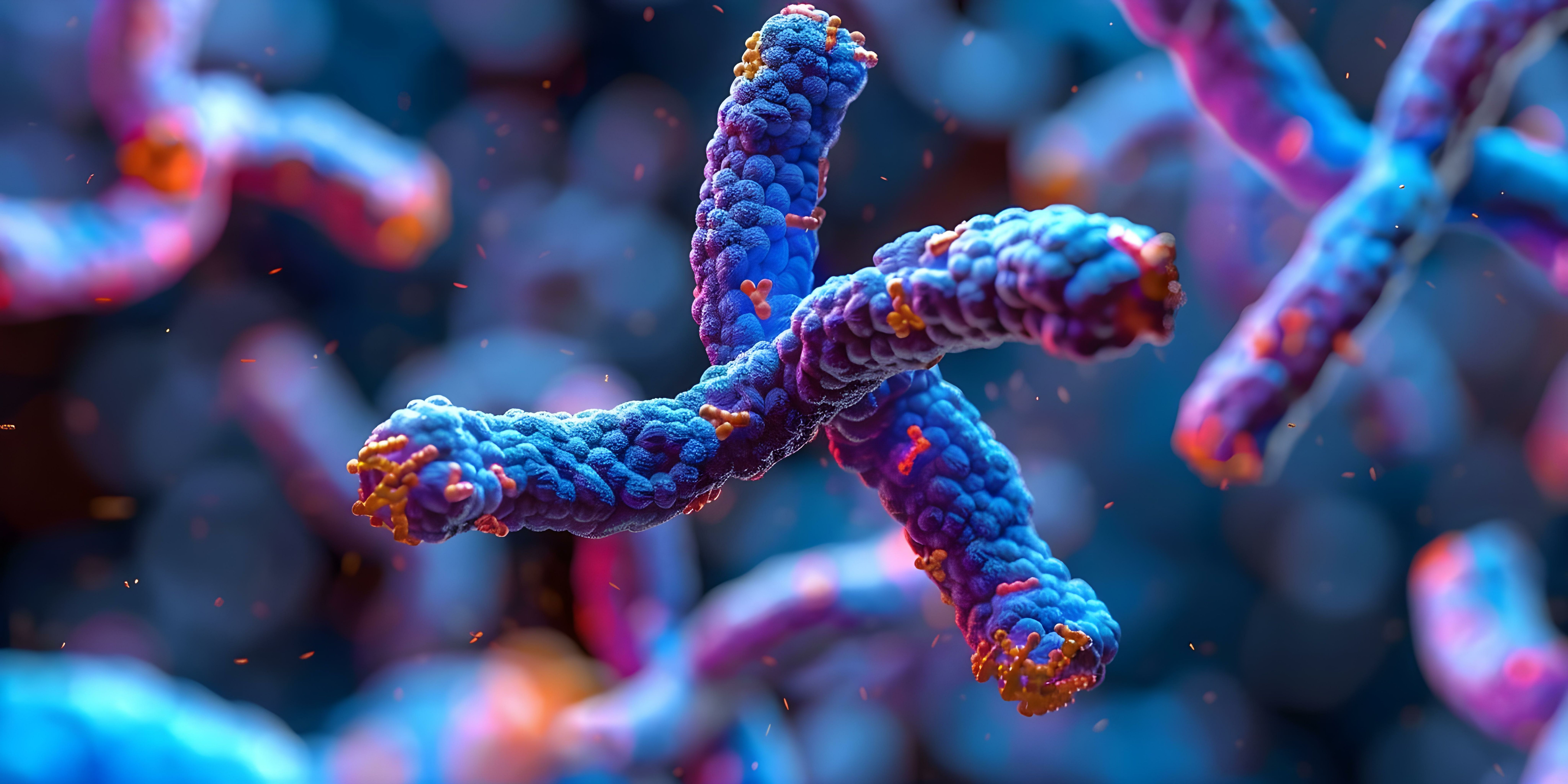- Center on Health Equity & Access
- Clinical
- Health Care Cost
- Health Care Delivery
- Insurance
- Policy
- Technology
- Value-Based Care
RIOK2 Regulates Telomerase Subunits to Prevent Telomere Shortening
New research linking telomere shortening to myelodysplastic syndromes (MDS) offers substantial therapeutic implications for affected patients and MDS research.
In a study published in Nature Communications, researchers reported a link between RIOK2, a ribosome biogenesis factor, and telomere shortening.1 Impairments to telomere maintenance occur during aging and have also been implciated in aplastic anemia, idiopathic pulmonary fibrosis (IPF), and dyskeratosis congenita, a stem cell disease. Excessive telomere shortening is also emerging as a causative factor for myelodysplastic syndromes (MDS).
Telomeres act as protective caps on the ends of chromosomes | image credit: Anastasiia - stock.adobe.com

In a previous study, the current authors identified RIKO2 as a “master transcription factor, ”regulating human blood cell development. In this new study, they demonstrate how it performs a similar transcription function in regulating telomere maintenance.
A transcription factor (TF) is a protein that controls the process of making messenger RNA (mRNA) from DNA during cell division. This ensures that genes are expressed in the desired cells, at the right time, and in the right amounts.
“Here, we identify RIOK2 as a novel transcriptional regulator of (telomerase) subunits TRiC and dyskerin that promote telomerase to block telomere shortening,” the authors wrote.
The goal of the current study was to determine how numerous RIOK2-dependent genetic processes might be associated with either telomere promotion or shortening. The new research explored the effects on aging as well as several telomere biology disorders.
In the study, cellular analyses–on multiple cell types–were performed at academic and medical centers throughout the US and Germany. Researchers accessed samples from populations of special interest, including individuals diagnosed with MDS and IPF, to investigate the possible role of RIOK2 in cellular processes.
The researchers used transcriptomics, ATAC-sequencing, chromatin immunoprecipitation, TRAP assays, fluorescence in-situ hybridization (FISH), and reconstitution experiments to establish that RIOK2 transcriptionally maintains telomerase activity and prevents telomere shortening. Data confirmed that loss of RIOK2 triggers telomere shortening in erythroid, non-erythroid, and stem cells.
In one experiment, researchers explored the expression of RIOK2 and corresponding telomere lengths in MDS patient-derived bone marrow cells. Findings revealed that mRNA expression of RIOK2 positively correlated with telomere length, confirming that low RIOK2 is associated with shortened telomere length in this cohort (r = 0.5086, P = 0.0008).
In another, they examined RIOK2 transcript levels of young individuals (19-30 years) vs nonagenarians (>90 years of age) using a publicly available dataset of peripheral blood mononuclear cells (PBMCs). Results demonstrated that mRNA expression of RIOK2 was significantly reduced in nonagenarians compared with the younger cohort.
To validate these results, the researchers investigated the association between age and RIOK2 transcript levels of RIOK2 in whole blood samples from the population-based study conducted out of Pomerania.2 They identified a gradual decline in mRNA expression of RIOK2 with increasing age of the individual (β = -0.0012, P = 0.042).
In another experiment, the researchers looked at RIOK2 involvement in IPF-associated telomere shortening.1 The disorder is characterized as a telomere biology disorder due to the presence of mutations in telomere-associated genes and prominent telomere shortening in peripheral blood mononuclear cells (PBMCs). However, telomere shortening in IFP is not clearly understood because a progressive loss of chromosomal ends has also been observed in patients without mutations in telomere-associated genes.
Using a transcriptomic dataset in IPF-derived PBMCs (n = 70 patients with IPF), analysis demonstrated that mRNA levels of RIOK2 were significantly reduced in IPF patients as compared to healthy individuals. RIOK2 transcript levels also positively correlated with prognostic factors for survival, such as forced vital capacity.
Since loss of RIOK2 also triggers telomere shortening in non-erythroid cells, the researchers tested lung tissue from IPF patients. RIOK2’s expression was shown to be markedly down-regulated in IPF-derived lung tissues as compared with healthy controls. Importantly, ectopically expressed RIOK2 was shown to alleviate DNA damage responses in IPF fibroblasts.
Additionally, the researchers considered mechanisms that underlie RIOK2-dependent pathways associated with telomere extension. In one notable example, analysis showed that RIOK2 regulates TriC complex subunits can stabilize the telomerase cofactor TCAB1, an integral component of telomere maintenance.
"Taken together, our results suggest that RIOK2-driven transcriptional programs may be therapeutically targeted to alleviate aging, anemia and other telomere biology disorders," the authors concluded, adding, “It is plausible that RIOK2 may regulate other unidentified targets associated with telomere maintenance."
References
1. Ghosh S, Raundhal M, Myers SA, et al. Identification of RIOK2 as a master regulator of human blood cell development. Nat Immol. 2021;23(1)109-121. doi:10.1038/s41590-21-01079-w
2. Volzke H, Schossow J, Schmidt CO, Jurgens C, et al. Cohort profile update: the study of heath in Pomerania. Int J Epidemiol. 2022;51(6):372-e383. doi:10.1093/ije/dyac034
